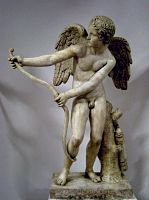31 - Wings of Desire: Plato's Erotic Dialogues
In this episode, Peter discusses Plato’s erotic dialogues, the Lysis, the Phaedrus and the Symposium, and talks about the relationship between love, friendship and philosophy in Plato’s thought.
Themes:
• G. Ferrari, “Platonic Love,” in The Cambridge Companion to Plato, ed. R. Kraut (Cambridge: Cambridge University Press, 1992), 248-76.
• A. Nehemas and P. Woodruff, Plato: Symposium and Plato: Phaedrus (Indianapolis: Hackett, 1989, 1995).
• T. Penner and C. Rowe, Plato's Lysis (Cambridge: Cambridge University Press, 2005).
• A. Price, Love and Friendship in Plato and Aristotle (Oxford: Clarendon Press, 1989).
• C.D.C. Reeve, 1992, “Telling the Truth About Love: Plato's Symposium,” Boston Area Colloquium in Ancient Philosophy 8 (1992), 89-114.
• C.J. Rowe, Plato: Phaedrus (Warminster: Aris and Phillips, 1986).
• F.C.C. Sheffield, Plato's Symposium: The Ethics of Desire (Oxford: Clarendon Press, 2006).
• G. Vlastos, "The Individual as Object of Love in Plato," in G. Vlastos, Platonic Studies (Princeton: 1981), 3-34.







Comments
what about love between a man and woman?
This episode made me wonder: how did the ancient greeks view love between a man and a woman? Was it some base thing, tainted by reproduction, that really wasn't love? Could a man love a woman, or only truly love another man?
forgot to add:
I forgot to mention: I really love the podcast. I never thought the history of philosophy would be something I would get into. I wish I took it in school. Put up a tip jar.
In reply to forgot to add: by Jim Hannon
Heterosexual love
Thanks for your kind comments! If you were minded to part with some of your hard-earned cash then, if you want to buy the book when it comes out (in a month or two) that would be welcome!
Regarding your question about heterosexual love that is actually mentioned in the Symposium, for instance in Aristophanes' speech he compares the sort of person who is homosexual to one who is heterosexual. Interestingly, they seem to think that homosexual inclinations are associated with a greater degree of manliness. But the main focus seems to be on love between men. I think you are probably right that heterosexual partnerships were often taken to be more functional - not only for the sake of child-rearing but also for building and maintaining a household. Bear in mind too the belief (most explicitly expressed by Aristotle) that women are unequal to men, so that a loving relationship between man and woman could never be one between two full equals. Of course that is practically always the same in the homosexual relationships Plato is imagining here too, since he has in mind an older man being paired with a younger man (a teenager), with the attendant inequality one would expect. The interview I did with Frisbee Sheffield (the next episode after this one) is interesting on this topic, as I recall.
In reply to Heterosexual love by Peter Adamson
the book
thanks for your reply. I look forward to getting the book!
In reply to Heterosexual love by Peter Adamson
the book
Awesome. I will definitely be getting the book.
Socrates' failed Rhetoric?
I realize the focus of this podcast is on Love; however, can I get someones opinion on the other implied topic of the Phaedrus and Symposium: Rhetoric.
I've completed Aristotle's Rhetoric and I'm currently studying Cicero's apocryphal book on the subject.
The essential elements of a good speech or article or narrative seems to be:
(1) excellent knowledge of the subject being discussed
(2) knowing your audience
(3) knowing the syntax, diction and style that appeals to that audience.
Incidentally, these three points are also perfect when selling some product - someone earlier was speaking of sales techniques (I think it was in the Gorgias section)
My question is this.
Eros and the Polis
I wonder if you are familiar with James Rhodes's close reading of the erotic dialogues in Eros, Wisdom, and Silence? Rhodes was a political scientist, and in that book he argued, among other things, that eros is key to understanding Plato's larger project. By his account, Plato perceived the rise of would-be tyrants in Athens as a symptom of the corruption of the youth by a twisted eros, a development he described in the Republic and fleshes out further in the Seventh Letter (which Rhodes believes is genuine or might as well be). The need to overthrow this tyrannical, self-serving eros with the exalted eros whose end is virtue and true beauty, for the good of the polis and the individual, is part of the purpose of the Socratic dialectic--to provide a right pedagogy for the soul rather than convey propositional truths. Rhodes then re-interprets the Symposium and Phaedrus in this light. I'm not sold on every aspect of his interpretation, but I think some of his major points are very insightful.
Anyway, I am glad you did decide to include the erotic dialogues in your discussion of Plato. The Phaedrus is a favorite of mine. I am currently working through your whole series; the podcasts are the perfect length for my commute.
While I'm here, I'll drop a mention of another book I've enjoyed recently that reviews the tradition of Platonic metaphysics, explains it reasonably, and takes it seriously: Eric Perl's Thinking Being.
A modern retelling of Aristophanes' myth
The Symposium lives on in rock opera.
This, a favourite song of mine from a favourite movie, with a somewhat philosophical bent about learning to be at one with yourself, might be of interest, even though it does meddle with the mythology and clear it of its comedy.
"It was a cold dark evening
Such a long time ago
When by the mighty hand if Jove...
It was a sad story how we became lonely, two-legged creatures..."
https://www.youtube.com/watch?v=c3oSc8gMrGo
In reply to A modern retelling of Aristophanes' myth by Daniel
Hedwig
Was that movie made before Harry Potter ruined the name Hedwig for all non-owls?
Anyway thanks - perhaps we could assemble a greatest hits of philosophical songs in rock operas. All of Quadrophenia, to start.
Transcript
Very Amazing and Informative,
Sir Can You Provide us with Transcript?
In reply to Transcript by Muhammad Abubakar
Transcript
There is a book version:
https://global.oup.com/academic/product/classical-philosophy-9780199674534?cc=de&lang=en&
Add new comment